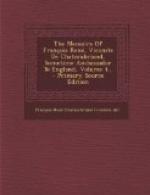|
This section contains 8,202 words (approx. 28 pages at 300 words per page) |

|
SOURCE: Doran, Eva. “Two Men and a Forest: Chateaubriand, Tocqueville, and the American Wilderness.” Essays in French Literature, no. 13 (November 1976): 44-61.
In the following essay, Doran examines both Chateaubriand's and Tocqueville's depiction of American forests as more than descriptions, but as images of human experience. Doran contrasts Chateaubriand's more positive depictions of the wilderness—as an expansive space reflecting one's personal power and God's presence—with the depersonalized and isolated environments portrayed by Tocqueville.
In his scholarly study, Tocqueville and Beaumont in America,1 George Pierson evaluates the materials pertaining to Tocqueville's American journey (notes, journals, letters) specifically from the point of view of their importance as commentaries on American life, and of their critical relevance to the development of Tocqueville's political and social thought. Yet in certain passages of Tocqueville's American journal one can detect also the expression of an intensely personal mood and an immediate, imaginative response...
|
This section contains 8,202 words (approx. 28 pages at 300 words per page) |

|


